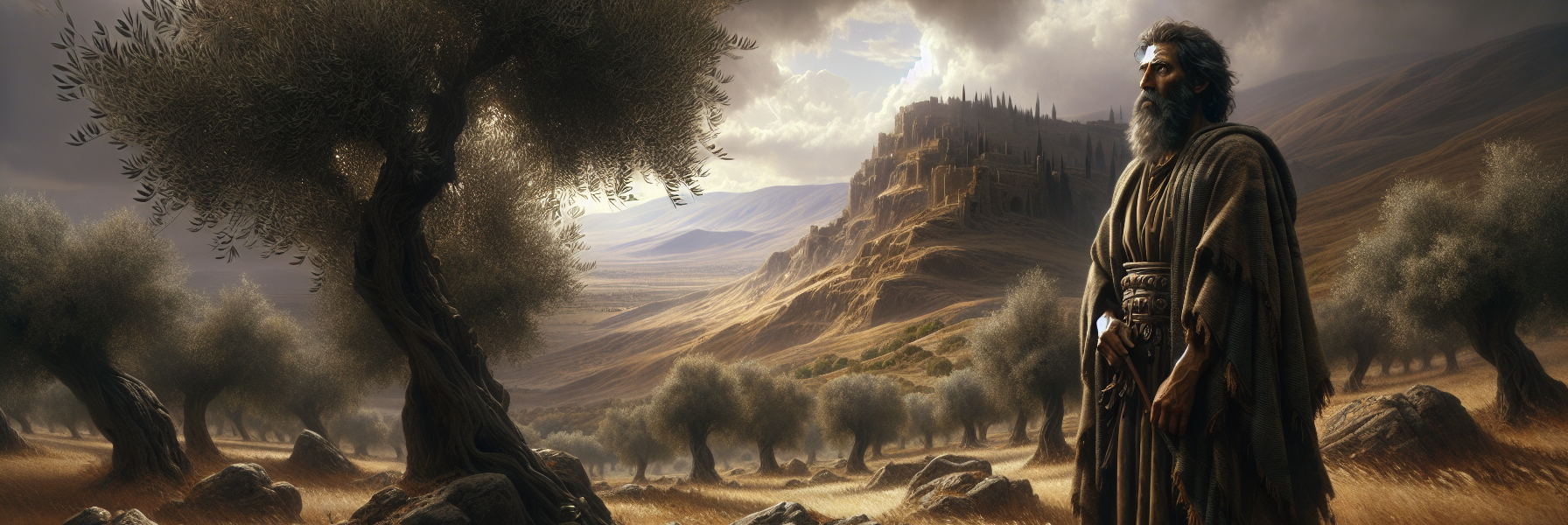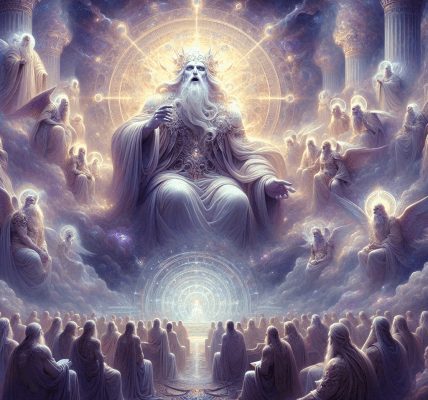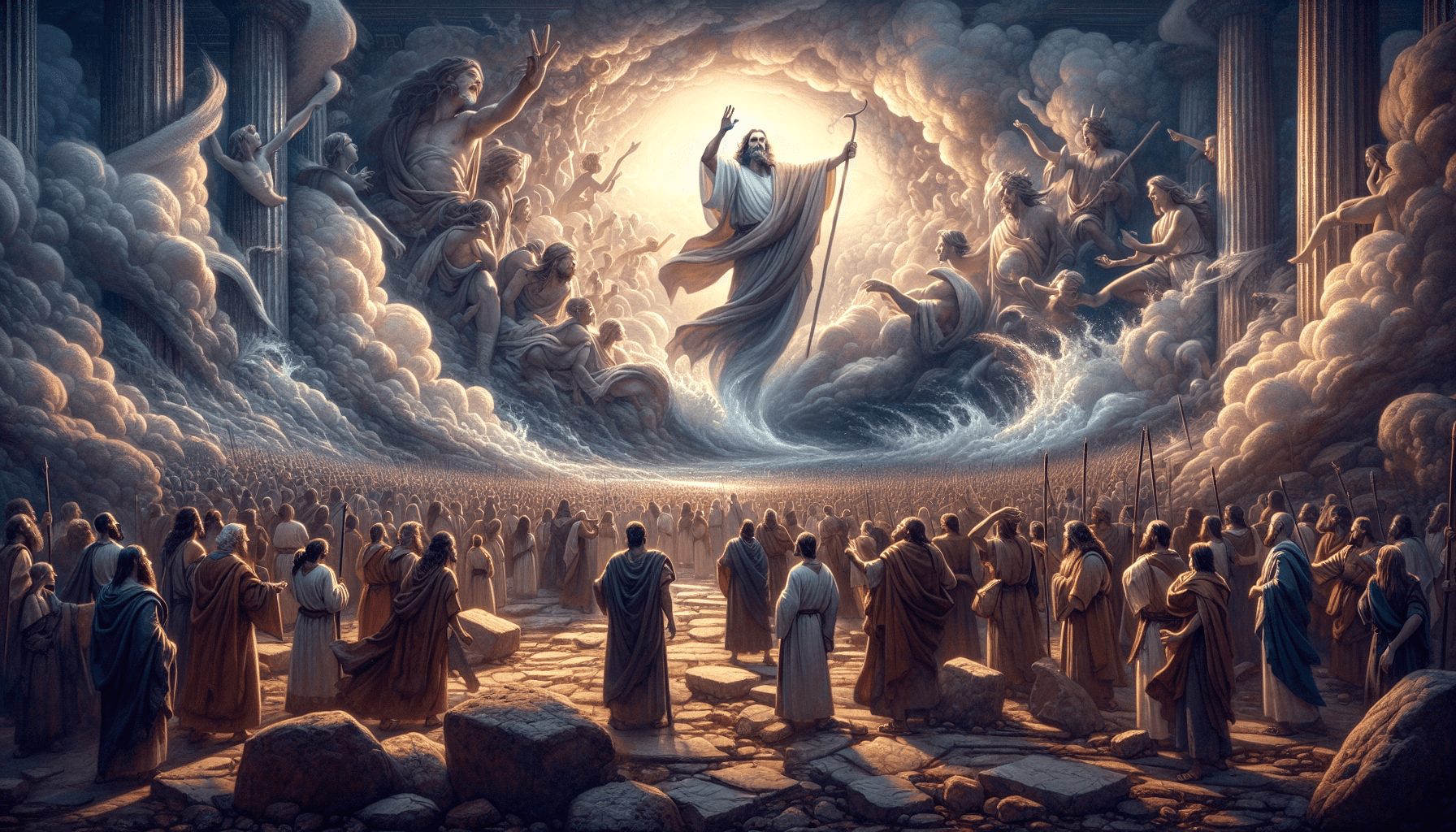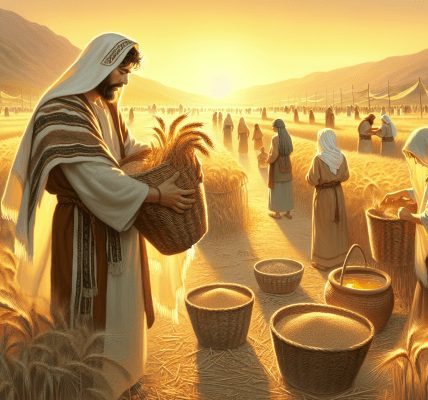**The Prophet and the Widow: A Story of Faith and Provision**
In the rugged hills of Gilead, where the wind whispered through the olive trees and the sun scorched the earth, there lived a man of God named Elijah. He was a prophet, a solitary figure clothed in a garment of coarse hair, bound with a leather girdle. His presence carried the weight of the Almighty, for the word of the Lord burned within him like an unquenchable fire.
In those days, the land of Israel groaned under the wicked reign of King Ahab, who had done more to provoke the Lord than all the kings before him. Ahab had taken Jezebel, a princess of Sidon, as his wife, and together they had led the people into the worship of Baal, erecting altars to the false god and silencing the prophets of the Lord.
Then, one day, the voice of the Lord came to Elijah, strong and clear: *”As the Lord, the God of Israel lives, before whom I stand, there shall be neither dew nor rain these years, except by my word.”*
With this divine decree burning in his spirit, Elijah stood before Ahab and declared the judgment of the Lord. The king’s face darkened with fury, but the prophet did not waver. The heavens themselves seemed to hold their breath, and soon the rains ceased. The streams dwindled to trickles, the fields cracked under the unrelenting sun, and famine crept like a shadow over the land.
### **The Brook Cherith: A Place of Hidden Provision**
The Lord then spoke to Elijah again, saying, *”Depart from here and turn eastward and hide yourself by the brook Cherith, which is east of the Jordan. You shall drink from the brook, and I have commanded the ravens to feed you there.”*
Without hesitation, Elijah obeyed. He journeyed to the hidden ravine where the brook Cherith still flowed, its waters cool and clear amidst the gathering drought. There, in the solitude of the wilderness, the ravens came—great, black-winged messengers of God’s provision. Morning and evening, they brought him bread and meat, their sharp beaks releasing the food before him as if in sacred offering. Elijah ate and drank, sustained not by the hands of men, but by the unseen hand of the Almighty.
Days turned into weeks, and weeks into months. The brook murmured its quiet song, a reminder of God’s faithfulness. Yet as the drought deepened, the stream began to shrink. The rocks, once submerged, now stood dry and exposed. Finally, the last trickle vanished into the thirsty earth.
### **The Widow of Zarephath: A Test of Faith**
Once more, the word of the Lord came to Elijah: *”Arise, go to Zarephath, which belongs to Sidon, and dwell there. Behold, I have commanded a widow there to feed you.”*
Zarephath—a town in the heart of Jezebel’s homeland, where Baal was worshipped openly. Why would God send him there? Yet Elijah did not question. He walked the long, dusty road, his sandals worn, his throat parched, until at last he saw the low houses of Zarephath baking in the sun.
At the city gate, he saw a woman gathering sticks, her shoulders bent with weariness, her garments thin and frayed. The Spirit stirred within him, and he knew: this was the one.
*”Bring me a little water in a vessel, that I may drink,”* he called to her.
She turned, her eyes hollow with hunger, but she nodded and moved to obey. Then Elijah added, *”And bring me a morsel of bread in your hand.”*
The woman stopped, her face twisting in grief. *”As the Lord your God lives,”* she said, her voice trembling, *”I have nothing baked, only a handful of flour in a jar and a little oil in a jug. And now I am gathering a couple of sticks that I may go in and prepare it for myself and my son, that we may eat it—and die.”*
Elijah’s heart ached for her, yet he spoke with unwavering certainty: *”Do not fear. Go and do as you have said. But first make me a little cake of it and bring it to me, and afterward make something for yourself and your son. For thus says the Lord, the God of Israel: ‘The jar of flour shall not be spent, and the jug of oil shall not be empty, until the day that the Lord sends rain upon the earth.’”*
The widow stared at him, her hands trembling. The demand was impossible—to give away the last of her food when death loomed over her household. Yet something in the prophet’s eyes, some unshakable authority, compelled her. She bowed her head, turned, and went to her small, dimly lit home.
With shaking hands, she mixed the flour and oil, kneaded the dough, and baked a small cake. Then, before feeding her son, she brought it to Elijah. The prophet received it with gratitude, and as he ate, the widow returned to her jar—and gasped.
The flour was still there. The oil still flowed.
Day after day, the miracle continued. No matter how much she used, the jar never emptied. The oil never ran dry. In the midst of famine, in the grip of despair, God had provided.
### **The Widow’s Son: A Sign of God’s Power**
But the trials were not over. One day, the widow’s son fell ill—so ill that his breath left him, and he lay lifeless in her arms. Her wails pierced the stillness of the house as she clutched his small body, her grief overflowing.
*”O man of God,”* she cried to Elijah, *”what have you against me? Have you come to bring my sin to remembrance and to cause the death of my son?”*
Elijah’s heart broke at her anguish. *”Give me your son,”* he said gently. Taking the boy from her arms, he carried him up to the upper room where he lodged. There, he laid the child on his own bed and cried out to the Lord, *”O Lord my God, have you brought calamity even upon the widow with whom I sojourn, by killing her son?”*
Then he stretched himself upon the child three times and pleaded, *”O Lord my God, let this child’s life return to him!”*
A stillness filled the room. Then—a gasp. The boy’s chest rose. His eyelids fluttered. Color returned to his cheeks.
Elijah gathered him in his arms and carried him down to his mother. *”See, your son lives!”*
The widow fell to her knees, tears streaming down her face. *”Now I know that you are a man of God,”* she whispered, *”and that the word of the Lord in your mouth is truth.”*
### **The Lesson of the Drought**
For many days, the drought persisted. The skies remained brass, the earth barren. Yet in that humble house in Zarephath, faith had taken root. The widow, once resigned to death, now trusted in the God of Israel. Elijah, the solitary prophet, had become a vessel of divine power.
And so, in the midst of judgment, mercy flourished. In the heart of idolatry, true worship was found. For the Lord God of Israel does not abandon those who trust in Him—He sustains them, even in famine, even in death, until the day of restoration comes.
And Elijah waited, knowing that the rain would come again—but only by the word of the Lord.




